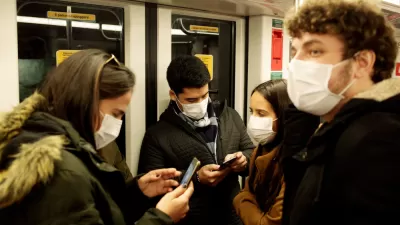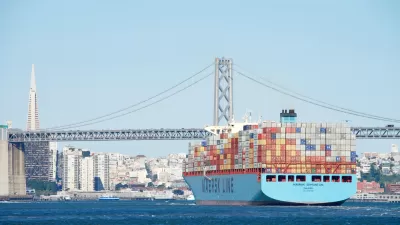As the European financial crisis drags on, money for the continent's numerous architectural and historical resources remains limited. As a result, cities are looking for new revenue streams, including billboards and image rights.
Anyone following the financial crisis knows just how hard the entirety of the European continent has been hit. With the resulting austerity measures, many of the continent's most treasured monuments are threatened by a lack of upkeep and restoration funds. As Ariana Eunjung Cha, of The Washington Post reports, "Historical buildings, churches, monuments, bridges, barracks, archaeological ruins and other sites are disintegrating from neglect. Local governments, desperate to find a way to preserve these sites before it is too late, are making up for budget shortfalls by hanging ads, selling usage rights and, in some cases, putting the structures themselves on the market."
Not everyone is pleased with the selling off of the continent's historical patrimony. "'Our monuments are being degraded by these exchanges of money between private and public powers. Are we so poor that we have to sell our grandfathers?' said Alessandra Mottola Molfino, national president of Italia Nostra, a cultural heritage group that has campaigned against the Colosseum and Fondaco di Tedesci projects."
According to Cha, "Government officials acknowledge that some of the deals they are striking are not ideal. But the officials are in a race against time. Even before the financial crisis, some local governments did not have enough money to properly maintain historic sites."
Among the countries embracing the monetization of historic sites include Italy, where space on a giant billboard on the Milan Cathedral costs $187,000 a month; France, where "the caretakers of Versailles have agreed to let two hotels open on the palace grounds;" and Spain, where construction of an office tower in the historic city center of Seville has been approved, threatening the city's status as a World Heritage site.
FULL STORY: Europe turns to corporate sponsors to preserve treasures amid financial crisis

Alabama: Trump Terminates Settlements for Black Communities Harmed By Raw Sewage
Trump deemed the landmark civil rights agreement “illegal DEI and environmental justice policy.”

Planetizen Federal Action Tracker
A weekly monitor of how Trump’s orders and actions are impacting planners and planning in America.

Why Should We Subsidize Public Transportation?
Many public transit agencies face financial stress due to rising costs, declining fare revenue, and declining subsidies. Transit advocates must provide a strong business case for increasing public transit funding.

Understanding Road Diets
An explainer from Momentum highlights the advantages of reducing vehicle lanes in favor of more bike, transit, and pedestrian infrastructure.

New California Law Regulates Warehouse Pollution
A new law tightens building and emissions regulations for large distribution warehouses to mitigate air pollution and traffic in surrounding communities.

Phoenix Announces Opening Date for Light Rail Extension
The South Central extension will connect South Phoenix to downtown and other major hubs starting on June 7.
Urban Design for Planners 1: Software Tools
This six-course series explores essential urban design concepts using open source software and equips planners with the tools they need to participate fully in the urban design process.
Planning for Universal Design
Learn the tools for implementing Universal Design in planning regulations.
Caltrans
Smith Gee Studio
Institute for Housing and Urban Development Studies (IHS)
City of Grandview
Harvard GSD Executive Education
Toledo-Lucas County Plan Commissions
Salt Lake City
NYU Wagner Graduate School of Public Service





























